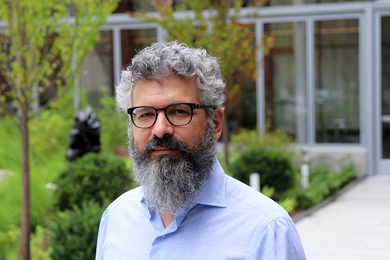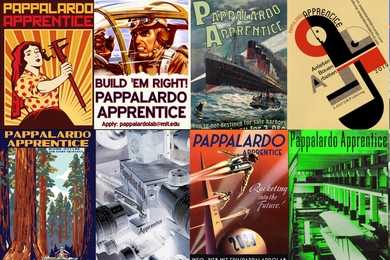Is the Iraq that Americans see today on their TV screens--rife with escalating violence that seems to verge on civil war--the inevitable result of the U.S. invasion to depose Saddam Hussein? Or did critical mistakes doom our best intentions to establish a democracy?
Those questions, posed by MIT visiting scholar Barbara K. Bodine, jumpstarted a conversation between two prominent journalists appearing in a panel titled "Reporters' Notebook: The US in Iraq," a MIT Center for International Studies (CIS) Starr Forum hosted by CIS on October 3.
"It's fashionable in some circles to say now: 'If only we had committed more resources to the occupation effort,'" said Rajiv Chandrasekaran, the former Baghdad bureau chief for the Washington Post, and author of the recently published "Imperial Life in the Emerald City," an account of life in the U.S. enclave in Baghdad, the Green Zone.
But Chandrasekaran speculates that perhaps the United States tried to do too much, too soon: "We needed to have had a smaller footprint there, to be less ambitious." For example, the United States didn't want to impose "just any old democracy." Officials wanted a secular, federalist democracy with an American-style free market, he said. They tried to institute bank sector reform, a flat tax, even laws on microchip design and intellectual property.
"We rewrote the traffic code," Chandrasekaran said. "We wasted time telling people to have both hands on the wheel while driving."
As a result, the United States did not move quickly enough to set up a system in which Iraqis could govern themselves, he said.
However, George Packer, who covers Iraq for The New Yorker, warned against "hindsight bias," that is, the idea that the deeper Iraq spirals into violence, "the more it seems it was inevitable that Iraq was always going to spiral down into a civil war."
Packer, author of the 2005 book "The Assassins' Gate: America in Iraq," said he is not convinced that disaster was inevitable. Yet "Iraq was a more tribal, a more religious, a more conservative and, at all levels, a more shattered society than most people understood. When the lid was lifted and nothing took its place ��� there was no center to hold Iraq together. The Americans were never in control from day one."
Yet "it's hard to know what would have happened if we didn't make mistakes because we made every mistake we could make," he said.
A key error, noted Bodine, was that Americans serving in the Iraqi Coalition Provisional Authority were selected for political credentials, not international experience. Chandrasekaran said that, for example, half of the incoming CPA staff had to apply for passports in order to go to Iraq.
Bodine, a former ambassador and diplomat for 30 years, said CPA officials chose to see Iraq as a "blank slate" in which they could impose their political vision. "The clean-slate school saw looting as a good thing," she added.
What is truly "astonishing" is that "no one has been fired in this war," Packer said. "No person has been made to pay a professional price for screwing up the most important American undertaking of my adult life."
The most difficult question put to the two journalists was whether U.S. troops should be withdrawn. Chandrasekaran speculates that a withdrawal could lead to a spike in violence, from dozens dead a week to hundreds slain. But he also wonders if the violence might level off over time. "Some (U.S.) presence might be necessary," he said.
Packer was more pessimistic about either leaving or staying: "I see nothing but bad things in either case. We have the tiger by the ears."
Both agreed that no progress could be made until the Bush administration honestly assesses the situation and acknowledges the mistakes made. This, they said, is not being done, even behind closed doors.
Packer cited an incident in which Gen. Jay Garner, who briefly served as director of reconstruction and humanitarian assistance for Iraq, met with President Bush, Vice President Dick Cheney and other officials and waited for the chance to present his honest assessment of the reconstruction effort. Instead, the meeting "turned into a back-slapping session" of congratulations. According to Packer, Bush even asked Garner, "Do you want to go to Iran for the next one?"
A version of this article appeared in MIT Tech Talk on October 18, 2006 (download PDF).





